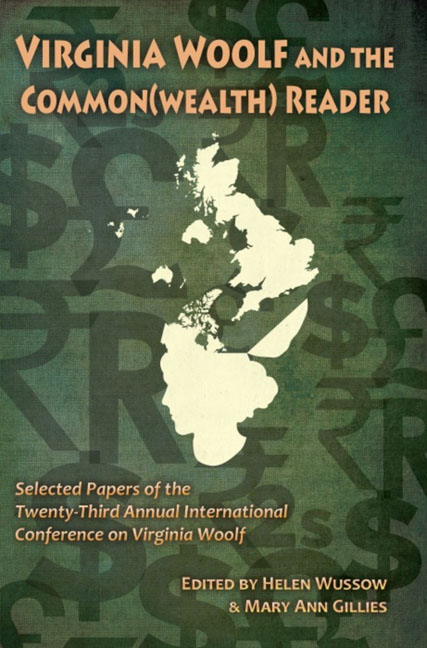Book contents
- Frontmatter
- Contents
- Introduction to Virginia Woolf and the Common(wealth) Reader
- Acknowledgments
- List of Abbreviations
- Invocations
- Networks of Affiliation: Foundations and Friends
- Education and Empire in Victorian Bloomsbury
- Synthesizing Civilizations: Leonard Woolf, the League of Nations, and the Inverse of Imperialism, 1928–1933
- James Stephen's Anti-Slavery Politics: A Woolfian Inheritance
- Networks of Empire: Virginia Woolf and the Travel Writing of Emily Eden
- Of Scrapbooks, War, and Newspapers: Leslie Stephen's Legacy
- Leslie Stephen's Science of (Ecological) Ethics
- “The Death of a Beautiful Man”: Rupert Brooke in Memory and Imagination
- Leonard Woolf and the Ceylon Civil Service: “I had come to dislike imperialism”
- Virginia Woolf in the British Commonwealth
- Woolf and the Commonwealth
- 1930s Onwards
- Woolf Beyond the Book
- Notes on Contributors
- Conference Program
Leslie Stephen's Science of (Ecological) Ethics
from Networks of Affiliation: Foundations and Friends
- Frontmatter
- Contents
- Introduction to Virginia Woolf and the Common(wealth) Reader
- Acknowledgments
- List of Abbreviations
- Invocations
- Networks of Affiliation: Foundations and Friends
- Education and Empire in Victorian Bloomsbury
- Synthesizing Civilizations: Leonard Woolf, the League of Nations, and the Inverse of Imperialism, 1928–1933
- James Stephen's Anti-Slavery Politics: A Woolfian Inheritance
- Networks of Empire: Virginia Woolf and the Travel Writing of Emily Eden
- Of Scrapbooks, War, and Newspapers: Leslie Stephen's Legacy
- Leslie Stephen's Science of (Ecological) Ethics
- “The Death of a Beautiful Man”: Rupert Brooke in Memory and Imagination
- Leonard Woolf and the Ceylon Civil Service: “I had come to dislike imperialism”
- Virginia Woolf in the British Commonwealth
- Woolf and the Commonwealth
- 1930s Onwards
- Woolf Beyond the Book
- Notes on Contributors
- Conference Program
Summary
When I set myself the task of examining Leslie Stephen's The Science of Ethics, I was thinking about our conference's theme of the “commonwealth” in terms of its archaic formulation as the “common weal,” defined by the Oxford English Dictionary as “the common well-being; esp. the general good, public welfare, prosperity of the community” (“Common weal” def. 1). But who—or what—do we include as part of our community? One of the OED 's literary examples for the term “commonwealth” suggests an ecological answer, through William Wordsworth's Excursion : “Through all the mighty Commonwealth of things; Up from the creeping plant to sovereign Man” (“Commonwealth” def. 5a). The common-good, in this formulation, extends from animal to vegetable to mineral; our community includes our environment. “The commonwealth of things” is what I hoped to find in The Science of Ethics : evidence that Leslie Stephen's ethics could be conceived of as an environmental belief system that encompassed his understanding of Darwin, agnosticism, and his experiences of mountaineering in the 1860s and 1870s. Unlike his Romantic predecessor Wordsworth, Leslie Stephen did not position “Man” as the sovereign of the natural world; further, his Alpinism bolstered his intellectual commitments to agnosticism and evolutionary theory. The way I think of it—or hoped to think of it—Leslie Stephen's “commonweal” is the whole environmental community of animal, vegetable, and mineral; humans are simply another member species of a vast and buzzing ecosystem.
And then I began to read The Science of Ethics. I am sure we are all well aware of the perils of thesis-driven writing, when we want so much to prove our neat argument that we force an unwieldy text into a box too small for it. As we see from the other panelists here today, Leslie Stephen always exceeds the pigeonhole we try to place him in. Was he primarily a historian, a literary critic, a philosopher, an essayist, a travel writer, a biographer, an editor, a mountaineer, a “Sunday tramp,” a father, a husband, a friend, a tyrant, bipolar, beloved? Perhaps we need to take Stephen at his own assessment as a “jack of all trades,” who spread himself too thin professionally for neat categories (“Mausoleum” 93).
- Type
- Chapter
- Information
- Virginia Woolf and the Common(wealth) Reader , pp. 45 - 49Publisher: Liverpool University PressPrint publication year: 2014



